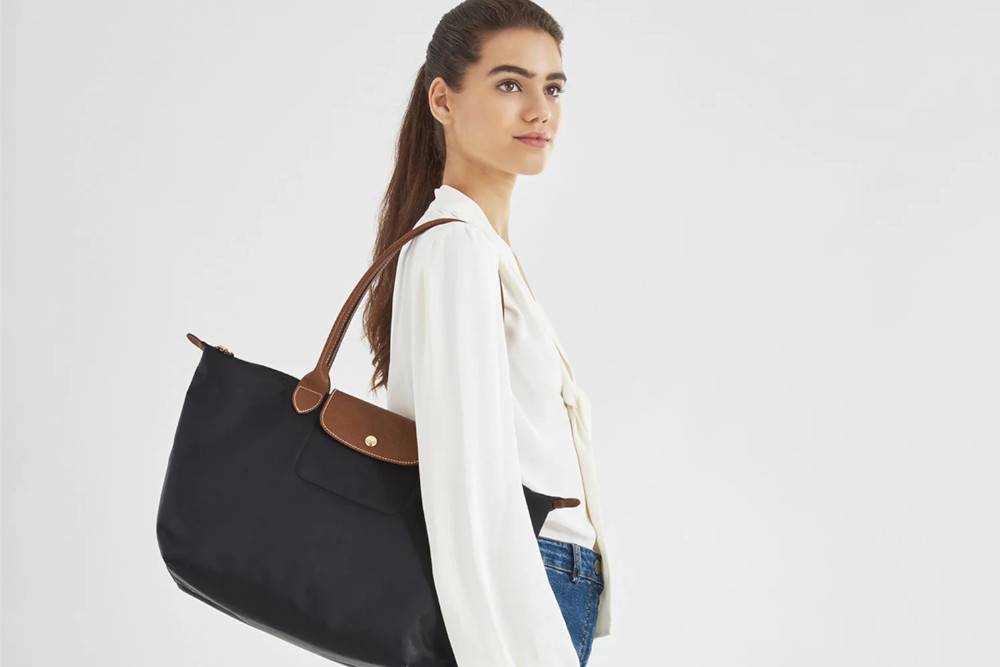
Longchamp is a French fashion retailer founded in 1948 in Paris by Jean Cassegrain. The multinational clothing-retail company specializes in luxury leather goods for women and men.
Longchamp makes clothing, accessories, shoes, and luggage. It has 1,500 retail outlets and 3,000 employees across 80 countries where it does business.
Longchamp is an independent Parisian fashion house privately owned and managed by the Cassegrain founding family. It offers versatile, practical, functional bags beloved all over the world.
Longchamp has committed to sustainability through the use of better materials. It has launched several product lines using recycled materials to reduce its environmental impact.
Panaprium is independent and reader supported. If you buy something through our link, we may earn a commission. If you can, please support us on a monthly basis. It takes less than a minute to set up, and you will be making a big impact every single month. Thank you!
Sustainability Rating: 3/10
Rating FAQ
Category: Clothing, accessories, shoes, bags
For: Women, men
Type: Basics, denim, dresses, knitwear, outerwear, boots, sneakers, flats, sandals, heels
Style: Classic, chic
Quality: High
Prices: $$$
Sizes: 2XS-3XL, 2-18 (US), 4-20 (UK), 32-46 (EU), 4-20 (AU)
Fabrics: Cotton, linen, lyocell, modal, viscose, cupro, acetate, polyester, nylon, spandex, acrylic, polyurethane, rubber, leather, wool, silk, down
100% Organic: No
100% Vegan: No
Ethical & Fair: No
Recycling: Yes
Producing countries: China, France, Morocco, Tunisia, Mauritius, Romania
Certifications: GRS, RWS, FSC
Sustainability Practices
Longchamp doesn't use any organic materials, such as organic cotton. It makes some products with recycled materials such as recycled polyester and regenerated nylon.
Only very few of its collections are dedicated to sustainable fashion. Most of the fabrics it uses are either natural without relevant certifications, such as regular cotton or linen, or synthetic petroleum-based fibers such as polyester, nylon, acrylic, and more.
Longchamp also uses a small proportion of semi-synthetic fibers or regenerated cellulosic fabrics such as lyocell, modal, acetate, and viscose.
Longchamp doesn't publish a list of all its manufacturers and processing facilities on its corporate website. It works with family businesses in long-term collaboration to guarantee consistency in production and quality.
The 2022 Fashion Transparency Index gave Longchamp a score of only 3% based on how much the group discloses about its social and environmental policies, practices, and impacts.
The French clothing retailer doesn't show any labor certification standard that would ensure good working conditions, decent living wages, health, safety, and other crucial rights for workers in its supply chain.
Longchamp doesn't have a code of conduct that applies to all its suppliers and subcontractors based on the regulations set by the International Labor Organization (ILO).
Longchamp doesn't disclose if it conducts any audits to improve the working conditions in its factories. It provides no information regarding external audits to identify potential risk areas.
Longchamp doesn't use exotic animal skin or fur. But it uses animal hair and angora, as well as leather, wool, silk, and down feathers to manufacture many of its products.
These animal-derived materials are cruel and unethical. They also harm the environment by producing greenhouse gases and waste. More sustainable alternatives exist.
Sustainability Goals
Longchamp doesn't measure its greenhouse gas emissions, water, land, energy use, pollution, and waste across the supply chain. It doesn't have any clear sustainability goals, science-based targets, or timelines to improve in the future either.
Reviews And Experiences With Longchamp
Have you had (good) experiences with shopping at or the products of Longchamp? Then leave us your rating below.
What We're Up Against
Multinational corporations overproducing cheap products in the poorest countries.
Huge factories with sweatshop-like conditions underpaying workers.
Media conglomerates promoting unethical, unsustainable products.
Bad actors encouraging overconsumption through oblivious behavior.
- - - -
Thankfully, we've got our supporters, including you.
Panaprium is funded by readers like you who want to join us in our mission to make the world entirely sustainable.
If you can, please support us on a monthly basis. It takes less than a minute to set up, and you will be making a big impact every single month. Thank you.






























0 comments